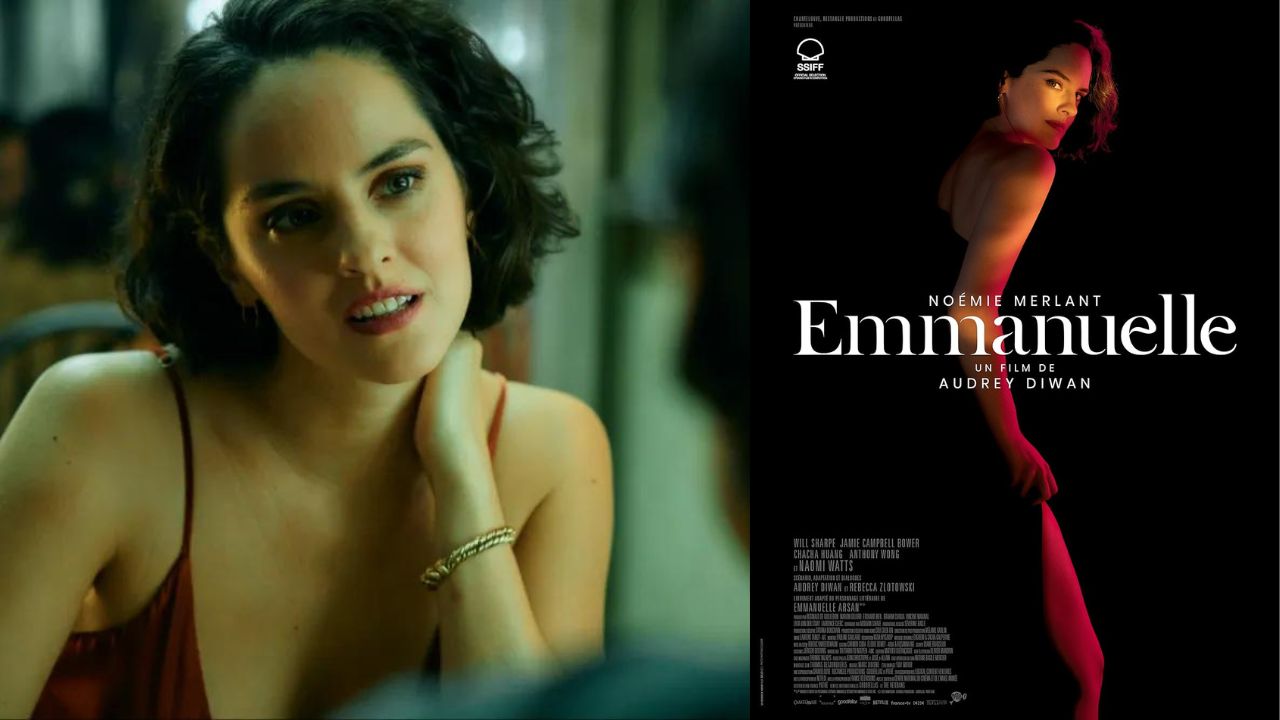Introduction
In 2024, Audrey Diwan, director of the critically acclaimed Happening, brings her vision to the erotic genre with Emmanuelle, a remake of the 1974 softcore classic. With the original Emmanuelle standing as a cultural touchstone of the sexual revolution, expectations were high for this updated film to deliver fresh perspectives on female desire. However, Emmanuelle (2024), despite its glossy production and impressive cast, struggles to balance its thematic aspirations with its predecessor’s sultry, liberated spirit. In this review, we’ll dive into its plot, characters, cinematography, thematic depth, and overall direction, comparing it to the original and assessing its success.
Plot Overview
In Emmanuelle (2024), Noémie Merlant plays the titular character, Emmanuelle, a hotel inspector on a professional assignment in Hong Kong. The film opens with a sensual encounter on an airplane, reminiscent of the original, but quickly transitions into a narrative focused on Emmanuelle’s internal exploration of her own sexuality and desires. Her assignment brings her into contact with hotel manager Margot (played by Naomi Watts) and Kei (Will Sharpe), a mysterious guest who becomes the object of Emmanuelle’s increasing fascination.
Unlike the original, which focused on Emmanuelle’s sexual awakening through her relationships with men, this version leans into Emmanuelle’s self-discovery in a far colder, more subdued environment. The film presents her journey as more psychological than erotic, resulting in a detached narrative where sex is less a source of joy and more a means of introspection. The plot lacks the provocative, adventurous flair that made the 1974 version iconic, opting instead for a more muted portrayal of female autonomy.
Character Development
The characters in Emmanuelle (2024) are intriguing but ultimately underdeveloped. Emmanuelle, as portrayed by Merlant, is a woman grappling with her identity and agency in a sterile world dominated by corporate ambition. Merlant’s performance is introspective and restrained, but the script fails to give her character the complexity necessary for viewers to connect emotionally.
Naomi Watts’ Margot, the hotel manager, represents a mirror for Emmanuelle’s potential future — a woman who has succeeded in a male-dominated business but at the cost of her own emotional satisfaction. Unfortunately, this dynamic is left largely unexplored, leaving Margot as a symbolic, rather than fully realized, character.
Will Sharpe’s Kei is meant to be a foil for Emmanuelle’s desires, but his presence in the film is enigmatic to the point of being ineffective. The chemistry between Emmanuelle and Kei is lukewarm, and their interactions feel more clinical than passionate. This lack of emotional depth hinders the audience’s ability to engage with their relationship.
Visuals and Cinematography
Visually, Emmanuelle (2024) is stunning. The film is drenched in luxurious tones, from the dark wood interiors of the hotel to the lush landscapes of Hong Kong. Director of Photography Laurent Tangy does an excellent job of framing each scene with a sense of detachment that mirrors Emmanuelle’s own emotional isolation.
However, while the cinematography is beautiful, it is often sterile, resembling more of an architectural digest than a sensual, erotic narrative. This stark visual style complements the film’s cool tone but detracts from the eroticism that should drive the story forward. In contrast, the 1974 Emmanuelle was lush, warm, and brimming with sexual energy, even if its themes were lighter and less introspective.
Themes and Message
Emmanuelle (2024) tries to modernize the themes of sexual liberation that defined the original, but it does so with an academic approach. The film is more concerned with exploring ideas about female agency in a post-modern world than embracing the visceral, sensual aspects of desire. Emmanuelle’s journey is depicted as one of reclaiming her body and desires from societal expectations, but the film never fully engages with these themes in a meaningful or emotionally resonant way.
In comparison, the original Emmanuelle was unabashedly about sexual exploration in a world that was still learning to accept open expressions of female desire. The 2024 version, by contrast, feels more like a clinical dissection of those same ideas, with far less engagement and passion.
Direction by Audrey Diwan
Audrey Diwan, whose previous work focused on reproductive rights and women’s issues, approaches Emmanuelle with an intellectual lens. Her attempt to steer the narrative away from traditional male-centric eroticism toward a feminist exploration of pleasure is commendable but ultimately lacks the warmth and humor necessary to make this a captivating film. The pacing is slow, and the film often feels cold and detached. Diwan’s strength lies in crafting a narrative that challenges traditional gender dynamics, but the film’s failure to embrace its erotic core leaves it feeling sterile.
Comparison with the Original
The 1974 Emmanuelle, directed by Just Jaeckin, was light on plot but rich in eroticism and visual allure. It was a product of its time, a celebration of sexual liberation wrapped in a softcore narrative. The film embraced its campiness and unapologetically presented female desire as something playful and joyous.
In contrast, Emmanuelle (2024) is more subdued, more intellectual, and less concerned with offering its audience titillation. While this could have been a strength, the film’s lack of emotional engagement and its sterile visual style make it a difficult film to connect with. It lacks the cultural impact of the original and feels like an over-corrected, academic reimagining rather than a vibrant, relevant update.
Final Thoughts
Emmanuelle (2024) is a bold attempt at reimagining an erotic classic through a feminist lens, but it falls short of being an emotionally engaging or erotically charged experience. Audrey Diwan’s intellectual approach to the material, combined with the film’s cold cinematography, leaves the audience disconnected from the characters and their journey.
While the film does raise interesting questions about female agency, desire, and identity, it fails to deliver the emotional depth or eroticism that the original film embraced. As a result, it feels more like a missed opportunity than a groundbreaking reimagining.
Is Emmanuelle (2024) Worth Watching?
If you’re looking for a thought-provoking take on female sexuality that prioritizes introspection over eroticism, Emmanuelle (2024) may appeal to you. However, if you’re hoping for a film that matches the original’s sensuality and playfulness, you may be disappointed.
For more information on where to watch Emmanuelle (2024), visit Where to Watch Emmanuelle 2024. Looking for top-rated films in a similar genre? Check out our Best Rated Films.
Watch the trailer for Emmanuelle (2024) on YouTube.





